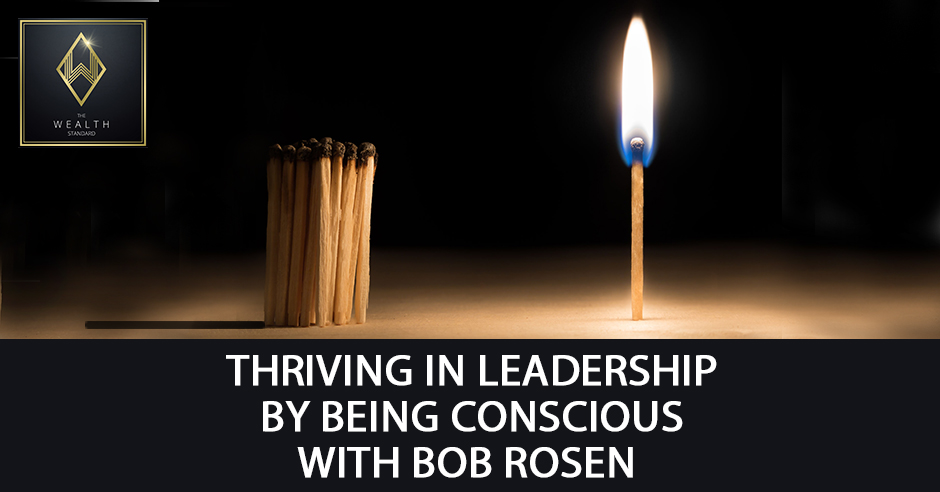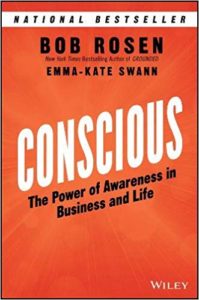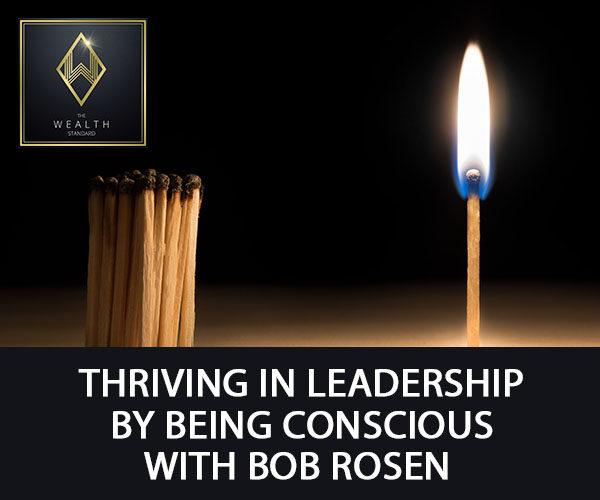Thriving In Leadership By Being Conscious with Bob Rosen
Podcast: Play in new window | Download

Being a leader today, no matter what organization or agency you are in, is much more difficult than it was before. The speed that technological advancements afford us has only created more and more options together with confusion and competition. What is to be done? Bob Rosen, trusted CEO adviser, organizational psychologist, and bestselling author, tells us his findings about leadership in today’s world and how we can navigate it more successfully. Bob begins by giving us a background from when he started Healthy Companies International, sharing the correlations they have found between relationships and its impact to leadership positions in the company. At the heart of it is his book, Conscious, where he shows the need to go deep into our roots – the physical, emotional, intellectual, social, vocational, and spiritual – in order to survive the change.
—
Listen to the podcast here:
Thriving In Leadership By Being Conscious with Bob Rosen
Bob, welcome to the show. It’s great to have you on. I’m excited for the interview.
It’s my pleasure.
You’ve been in the game of business and have probably looked at tons of different leadership structures and personality types. Why don’t you give us an idea of your background from the time you started Healthy Companies International until now?
I was trained as a clinical psychologist. My first job was in the Department of Psychiatry at George Washington School of Medicine. I was treating successful families and the fathers never showed up for treatment. I got very interested in how these men were having an impact on their family is by extension in their companies. I started writing about what was possible if you had healthy leaders and healthy companies working together. I got a call from the MacArthur Foundation in Chicago and they threw a bunch of money at me to start for a not-for-profit. We studied top executives and interviewed over the years 600 CEOs in about 55 countries of large companies. Toyota, Boeing, Coca-Cola and Procter & Gamble to try to get a sense of how these leaders were building great companies. Now, Healthy Companies is a leadership and transformation company. We do consulting mainly around the human side of organizations. We also do a lot of leadership development. We’re bringing the messages of being grounded and conscious into organizations at all levels so that people and companies can prepare for all the disruptions and change that is happening and will happen in the future.
Speed is a critical driver. Uncertainty is reality. Click To TweetSome of the backgrounds had to do with men and families and that they would not show up to these therapy sessions with their families. Did you find a correlation between maybe how a father has an impact on his family? If a man has an impact if he’s in a leadership position in the company?
Over the last years, the pace of change has increased dramatically. Speed is a critical driver. Uncertainty is reality. The world is more complex with more choices. Technology is the uber disruptor in our personal lives and our business lives. Competition comes from everywhere. Everybody in business is like a global businessperson because of technology and the fact that money markets and people can come from everywhere. This has caused a lot of stress, a lot of opportunities and a lot of challenge for leaders. Leading now, whether you’re leading a not-for-profit organization, a government agency or a large global corporation is much more challenging and much more difficult. When I say leading, I’m talking about leaders at any level of the organization. It’s interesting, as the world has changed outside in a counter-intuitive way, it’s forced us to look inside for answers. Leaders have had to look inside themselves to become more agile, more resilient, more adaptive, more collaborative and higher performing. That’s been a real shift for all leaders, men and women. It’s been a hard one, especially for men because we grew up at a time when men fought their way into new solutions. They didn’t feel their way into new solutions oftentimes. They made the decisions in more authoritative workplaces. We hid from vulnerability and weakness. We didn’t make mistakes in public. We didn’t fall down and get up and tell anybody. The world has changed for us and we’ve had to develop some new mindsets for the new world order.
I’m curious about what you said and looking at leadership in the past, I agree with your comments. Men particularly fighting for what they have and wearing some façade, not necessarily going within and being self-aware. Did that work in the past and if so, the employee, the people that were being led, was it their mindset changed first or was there some other cause?
A lot of factors changed. One is that the workforce demanded and is demanding more from their leaders. They want their leaders to be more real, more honest, more authentic. Acknowledging with them in a partnership that the world is tough and we can create and we can navigate through this together. The workforce has been a factor. Secondly is the evolution of men and women. We’ve seen changes within both genders, preparing us and changing our relationship with each other. Lastly is the environment has changed so dramatically. The level of complexity and uncertainty is so high. The tenure for top executives is going down and down. There’s so much pressure on leaders to perform. The world is changing so quickly on them and they don’t have all the answers. Another factor is that who has power in the organization has fundamentally changed. With technology, everybody has access to knowledge and information and so authority, responsibility, accountability and power has been pushed down in the organization. Mainly because people can make decisions and are closer to the customer down through the organization. The world’s gotten complex and the top executives don’t have all the information. All of those factors have contributed to the evolution of the concept of leadership.

Being Conscious: The dilemma is that many of our workplaces are not designed for humanity.
The world has become very complex in a sense. The transient nature of employees as well is interesting to note. This brings up a question I wanted to ask which is about the name of your company, which is Healthy Companies International. Remind us again when the company was founded.
We were founded in 1987. That was some time ago. I’ve written eight leadership books. The first one was called The Healthy Company. I was on a plane and when you produce your first book, you want to take it out, open it up on a plane and hope that somebody next to you says, “What an interesting book.” and it happened. The guy next to me on the plane says, “It’s an interesting title. Is that a novel?” It was a smack in the face because I thought this idealistic understanding of the potential of companies was so critical. This guy didn’t think that it was even possible. In the last years since I wrote that book, there’s a growing recognition by the more progressive companies that if they don’t create cultures and environments that enable people, inspire people, challenge people and engage people their hearts and minds, they’re not going to have a very successful company for too long. That was my first book, Conscious. Another book is Grounded, which is based on the idea that we grew up in a paradigm that says that what you do defines who you are. The environment is forcing us to flip that to say that who you are as a human being drives what you do and how you perform.
The book’s organized around six roots of being grounded. Your physical, your emotional roots, your intellectual roots, your social roots, your vocational roots and your spiritual roots. Those leaders who exhibit those roots have a stronger foundation when the winds of change come and blow at them. Conscious was written as the companion book. It basically talks about how do you accelerate yourself? How do you move faster and adapt faster in this changing world? It’s based on the notion that the more conscious you are, the more aware you are of yourself, your relationships, the environment and surroundings around you. The faster you adapt and the higher performing you are. Conscious is organized into four practices. The first one is to go deep and to discover your personal self inside. The second is to think big into a world of possibilities. The third is to get real, be honest, intentional, step up and be a change agent. The last one is to step up. To be a transformational leader in whatever you do. We have data to support that those leaders who are self-aware outperform their competitors.
The world is more complex with more choices. Click To TweetWould you mind giving us maybe some examples? I’m assuming there’s some in the book but giving some examples of how to apply this methodology or apply this philosophy to leadership of a big business.
In Conscious, we link pitfalls to practices. One of the problems in business now is that many of us are too unaware or superficial. We don’t go deep enough, we don’t understand our insights, what’s going on inside of us. The world keeps changing so fast and we don’t stop and reflect. The practice of go deep is to help people become more aware and introspective. One of the things we do in our workshop is we have people look at their life story and to make sense of who they are or how did the past influence how they show up now. We also help them to become more comfortable being uncomfortable in this world. Many of us grew up believing that the goal of life was to be happy. You’re supposed to feel good all the time, but in the new world order, it’s bumpier. We have ups and downs. We have to learn not only to get comfortable being uncomfortable, but we have to learn how to be resilient to fall down and get up.
That means spending more time in our positive emotions, which comes from positive psychology. It means managing our threats more effectively, knowing the connection between our mind and our body. Also, using what we call our thought liberators rather than thought underminers or hijackers. There are very specific tools in the book and in our workshops to do that. Think big is about being curious and adaptive. One of the great examples of go deep is Oprah Winfrey. I watched her in real time. She has dealt with her personal demons and her internal self on the public stage. She’s been authentic. She showed up with an open mind and an open heart. She has a wonderful quote that says, “If I only knew that being authentic would make me this much money, I would have done it a lot earlier.” It’s a sign to people that people are hungry for people who are authentic. Who tells the truth about the internal experience that we’re facing, but many of us are afraid of that.
What is it about that it’s so compelling? With the training in psychology, what is it about being empathetic, transparent and open and being willing to talk about your faults? What is it about that that resonates so deeply with somebody else, especially someone that you’re in a leadership position with?
As the world has changed outside in a counter-intuitive way, it's forced us to look inside for answers. Click To TweetMany of us grow up in the paradigm that says the goal is to be the smartest kid in the room. We’re reinforced by report cards and performance appraisals in the workplace. We’ve outgrown the smart paradigm because everybody’s smart. The new paradigm is to be conscious and to be aware. Smart gets you in the room, but conscious keeps you there. That’s one shift. Another reason is if you think about it every moment of every day, we make a choice consciously or unconsciously to live that moment in fear or love. We have a set of fear-based emotions. The three primary ones are anger, sadness and anxiety. We have love-based emotions, confidence, optimism, compassion, generosity, faith and love. The more people can experience the full range of that emotional continuum but spend most of their time in their positive emotions, which are hardwired just like their negative emotions, the easier it is for them to navigate through all this complexity and change. The dilemma is that a lot of people live their life in these fear-based emotions. They get hijacked by demons from the past. They worry constantly about what’s going to happen in the future. They magnify or generalize situations that are not rational.
Each of us is hijacked by one of those three primary emotions whether it’s sadness, anger or anxiety. We generally know that in the privacy of our hearts and minds. Being aware of that is very important. The dilemma is that many of our workplaces were not designed for humanity. Increasingly younger people and the external environment is forcing leaders to be more confident and humbler, more humane, a real person in the workplace. People love that. It frees you up, so you don’t have to hold onto all the fear-based emotions. You can be more positive, more joyful and navigate through it. One of the specific tools is to be able to determine the difference between what you can and cannot control. We, in psychology, call this ceaseless striving. People who are constantly trying to control things that they can’t control and it creates tremendous distress. Everybody knows that. How do you allow yourself to be personally powerful and at the same time accept and be comfortable with uncertainty? That’s a real important tool for people to develop in this new workplace.
As you do your consulting and you with work companies, is there as much emphasis put on the employees. At least the training of the employees or the education of the employees as there is with the leadership? I imagine if it was one-sided, leaders would probably resonate with a lot of what you’re saying, but then it could be somewhat disruptive if there hasn’t been context created for the employees.
We bring our Grounded and Conscious workshops into organizations and we say that it’s important to facilitate them at the top with executives. We certify and train middle managers, human resource or learning managers or even operating unit managers to facilitate those workshops. We allow our tools and all of our materials to go in those packages so that a lot of middle managers are starting to learn this. We use technology for the masses for educating people in electronic learning and digital environment. It’s important. If you don’t do this, you don’t have a contrary of mature healthy adults in your organization. If you don’t, it’s very hard to execute your business strategy. It simply is because people are not showing up as healthy, mature adults. What happens is we create blame cultures where the top blames the bottom for not getting the work right. The bottom blames the top because the leaders are too greedy, selfish or don’t know where they’re going rather than a culture of commitment. The shift from being unhealthy to healthy is to move toward that culture of commitment, but it happens one leader at a time. You can’t change the culture if you’re not willing to recognize that everybody’s got to change. Every CEO I talked to is talking about organizational transformation and business transformation. Oftentimes, what we forget or we minimize is if you want the organization to transform, every person in the organization has to transform. That requires an investment, it requires priorities.

Being Conscious: There’s this power that is so contagious that if you can own it, you can get a group of people to do some pretty marvelous things.
A company is an abstract. A company is not like a living thing. It’s a group of individuals. It’s creating some humanity out of the culture of a business. With the lens that you have to business, what are some things you see, what are maybe some companies that exemplify this notion of being conscious? What are some companies that you’ve seen struggle because of not recognizing the notion of being conscious?
One company in particular for the latter would be Wells Fargo. Completely was not conscious of what they were doing. Maybe there were a couple executives who were, but the company as a whole didn’t realize that their incentives were all out of whack. They were forcing customers to buy products that they didn’t want. It’s cost them multiple billions of dollars and it’s still happening where the leaders were not conscious of what was going on. Contrast that to a company like Google or Apple who are constantly on the edge and creating learning cultures. The People Leader Laszlo Bock had Google for years talked about the importance of learning agility and learning on the fly. Seeing connections and helping people develop in their jobs. That’s what healthy companies do. Another one would be Reed Hastings at Netflix out front on trying to create a values-based healthy culture.
We have to learn not only to get comfortable being uncomfortable, but also how to be resilient to fall down and get up. Click To TweetWhat’s interesting about Reed is that if you look at his history, Netflix has changed its business model multiple times. It always had a vision to create video streaming on the internet. The world was not ready for that when he started the company in 1997. He was willing to reinvent the company over time. He had to bring people with him. That required thinking big and engaging people in conversation about now and tomorrow. That’s a very important skill some people call it ambidexterity. It’s helping people live for now and lead for now and prepare for tomorrows simultaneously. That requires a different mindset. There are lots of examples. Michael Phelps is a great example. In Get Real we talk in the book about the accelerators. Those things inside of us that drive us forward, like our confidence, our faith and inspiring leaders.
Also, our hijackers, those things inside of ourselves that are thinking errors, our emotional derailers that I talked about. Our desire to control or perfectionism, these are hijackers. Michael Phelps is a great example. I used his example in the book of somebody who had mastered these accelerators. His intense drive for success and his perfectionism in the swimming and the like. He won all these gold medals and then after Beijing, he fell apart because he hadn’t addressed the hijackers in his life. Being a normal real human being like all of us, he ended up going into a treatment facility. As you recall when he came out in Rio and emerged as this mature adult with a family, he seemed like a different person when you interviewed him. He had gone deep and gotten real with himself. He was able to emerge a stronger person. That’s what Conscious is all about is giving people the tools they need to thrive in this disruptive and accelerating world.
This has been a fascinating conversation. I’m looking forward to reading the book. Would you tell us about those who have either mentored you or inspired you directly or indirectly over the years to understand and be passionate? You’re clearly passionate about what you believe in. Which of these principles help transform businesses? Would you mind going through maybe some of the mentors you’ve had and the things or events that have been inspired you over the years?
The more we can move from negative energy to positive energy, the better off we'll be. Click To TweetI got a PhD in clinical psychology, but I had to learn business from the streets. I didn’t get an MBA. What I did was I went out and I sat face-to-face with all these CEOs over about a twenty-year period. I learned a ton about how they think, how they feel and how they manage their boards. How they build executive teams, how they deal with their fears and frustrations. How they built cultures. Although every business is different, there are some common maladies that cut across any business, any industry, any country around the world. Many of them were mentors, they probably never knew that they were my mentors. For me to have to step back from those interviews and write stories about them in my books helped me a great deal in understanding the challenges of leading complex companies and complex organizations. I’ve tried to invest in my own development. There were multiple times I could get off the train and do stress management or do organizational development, which is very important. I kept stretching myself to get to the CEO until the entire enterprise. I’ve had therapy over the years and I tend to be a pretty authentic person. When I was younger, the most important thing that I wanted to be perceived as when I gave a speech is somebody who is smart. I was a smart kid. Now, I go in and talk and I want people to leave the room a little bigger and a little better than I found them. I evolved as a human being to a more conscious state, to a more other oriented perspective which has been healthy for me.
We have a whole other conversation about the school system, education system that is ingrained in people. What the definition of smart is and stupid. I have almost two teenagers. I have a fourteen-year-old and a twelve-year-old. I have a four-year-old. They’re in this time of their life where that is starting to affect them. The conversations we’ve had have been pretty remarkable because even though society is progressing so quickly, you still have these ancient things that are involved in the school system in teaching the youth, which is flawed as you put it and I totally agree. That’s one of those things where a lot of people are driven by looking smart. Doing everything possible to avoid looking stupid when they make a mistake. That’s very unhealthy. I’ve seen it with the business I run and I’ve seen other businesses as well. It’s one of those complexes that creates some big disruption.
There’s a difference between negative energy and positive energy. That energy sits inside you, team or classroom. It sits inside an organization or a society. The more we can move from negative energy to positive energy, the better off we’ll be. We’ll be healthier, more fulfilled and higher performing.
Smart gets you in the room, but conscious keeps you there. Click To TweetThat’s amazing about someone that is aware of how to have that positive energy and then how to express it. It’s viral. It can impact huge numbers of people. We’ve seen leaders over the years, Nelson Mandela comes to mind. There’s this power there that is so contagious that if you can own it, you can get a group of people to do some pretty marvelous things.
I see it all over the place and not just at the top in the middle and the bottom of organizations. People who are willing to step up and be grounded and conscious, not only are they happier, but they do better in life.
Do you think that the same leadership principles, tactics and being self-aware apply in politics?
That’s probably more so. These folks live on the public stage 24/7. They’re role models one way or the other. How they show up as human beings influence us. It’s important to have low crime. It’s important to have a good economy. It’s important to have a safe and secure country. It’s also important to communicate to people what it means to be healthy, grounded and conscious as a human being because people look to our leaders. I was at a speech that Jeff Bezos gave, the CEO and Founder of Amazon. He said in the speech, “One of the things that concerns me is that leaders think that they shouldn’t be scrutinized. The definition of leadership is that you will be scrutinized because leadership is a public relationship, wherever it is in government or business.”
Your feedback is like your scorecard. The feedback is the score in how effective of a leader you are.

Conscious: The Power of Awareness in Business and Life
No question about it. We need to help leaders develop a thicker skin. One of the dilemmas is that we idealize our leaders or we demonize them. We don’t allow them to be human beings on the public stage. Where they don’t have to have all the answers. We’re partially responsible for this. It goes in both directions.
Would you tell the audience the best way that they can pick up the book, Conscious: The Power of Awareness in Business and Life?
I’m happy to say it became a national bestseller. I’m excited about this and it’s not too long. It’s only about 200 pages. You could find it at Amazon, you can find it in all of the websites. You can also come to HealthyCompanies.com and find out about us. I wish everybody in your audience good luck on their journey.
Bob, it’s great to meet you again. Thank you so much for being on here and best of luck. Congratulations on the success of your book.
Thank you so much.
Important Links:
- Healthy Companies International
- MacArthur Foundation
- The Healthy Company
- Conscious
- Grounded
- Get Real
- https://BobRosen.com/
- https://Twitter.com/BobRosen
- https://www.Facebook.com/BobHRosen/
- https://www.Linkedin.com/in/bobrosen/
- https://www.Amazon.com/dp/0874777089/ref=cm_sw_su_dp
- https://www.Amazon.com/gp/product/0140242724?ie=UTF8&tag=httpwwwgoodco-20&linkCode=as2&camp=1789&creative=9325&creativeASIN=0140242724&SubscriptionId=1MGPYB6YW3HWK55XCGG2
- https://www.Amazon.com/Global-Literacies-Business-Leadership-National/dp/0684859025/ref=sr_1_1?s=books&ie=UTF8&qid=1373978728&sr=1-1&keywords=global+literacies
- https://www.Amazon.com/Just-Enough-Anxiety-Business-Success/dp/1591841976
- https://www.Amazon.com/gp/product/1933199369/ref=s9_simh_gw_p14_d0_i3?pf_rd_m=ATVPDKIKX0DER&pf_rd_s=center-2&pf_rd_r=0N9FWQJG4ZX8YFHTGJC3&pf_rd_t=101&pf_rd_p=1389517282&pf_rd_i=507846
- https://www.Amazon.com/Conscious-Power-Awareness-Business-Life/dp/1119508452?__hssc=36512319.1.1541004814612&__hstc=36512319.d05d263b1264a03e362cb464587e45af.1541004814611.1541004814611.1541004814611.1&__hsfp=1329992763&hsCtaTracking=bdc1637b-d2c9-48f9-bc69-6686ca994332%7C511590f2-2f2e-4634-a5da-7f82236b987d
- https://www.Amazon.com/dp/1118680774/ref=cm_sw_su_dp
About Bob Rosen
 Bob Rosen is a trusted CEO adviser, organizational psychologist, and bestselling author. He has long been on a mission to transform the world of business, one leader at a time. Bob founded Healthy Companies International over twenty years ago with the singular goal of helping executives achieve their leadership potential. With support from a multiyear grant from the John D. and Catherine T. MacArthur Foundation, Bob and his colleagues began an in-depth study of leadership. Since then, he has personally interviewed more than 500 CEOs in 45 countries in organizations as diverse as Ford, Motorola, Johnson & Johnson, Singapore Airlines, Brinks, Northrop Grumman, Toyota, Citigroup, PepsiCo, ING, and PriceWaterhouseCoopers. He has become an adviser to many of these companies, and coordinates the Healthy CEO Roundtable.
Bob Rosen is a trusted CEO adviser, organizational psychologist, and bestselling author. He has long been on a mission to transform the world of business, one leader at a time. Bob founded Healthy Companies International over twenty years ago with the singular goal of helping executives achieve their leadership potential. With support from a multiyear grant from the John D. and Catherine T. MacArthur Foundation, Bob and his colleagues began an in-depth study of leadership. Since then, he has personally interviewed more than 500 CEOs in 45 countries in organizations as diverse as Ford, Motorola, Johnson & Johnson, Singapore Airlines, Brinks, Northrop Grumman, Toyota, Citigroup, PepsiCo, ING, and PriceWaterhouseCoopers. He has become an adviser to many of these companies, and coordinates the Healthy CEO Roundtable.
Bob is a frequent keynote speaker at a variety of global events. Bob has spoken on issues ranging from Leading Transformation and Leading Innovation to Leading Growth and Leading in a Global World. The underlying foundation of all his work is the power of being a healthy and grounded leader and building high-performance executive teams as the catalyst for personal and organizational success.
Bob is a frequent media commentator who has been quoted in The New York Times, Wall Street Journal, Fortune, Bloomberg Businessweek, Financial Times, Time, Chief Executive Magazine, and more. Bob’s books include The Healthy Company, Leading People, Just Enough Anxiety, Global Literacies, The Catalyst, the New York Times Bestseller Grounded®, and his latest Conscious.
Bob graduated from the University of Virginia. He subsequently earned a PhD in clinical psychology at the University of Pittsburgh. Bob teaches in executive education programs, and has been a longtime faculty member in the Department of Psychiatry and Behavioral Sciences at George Washington University’s School of Medicine.

















